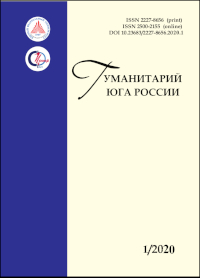Архаизация российского общества в фокусе научно-исследовательских практик и методологические параметры исследования
Аннотация
Литература
Ахиезер А.С. Архаизация в российском обществе как методологическая проблема // Общественные науки и современность. 2001. № 2. С. 89–100.
Ачкасов В.А. «Взрывающаяся архаичность»: традиционализм в политической жизни России. СПб.: Изд-во СПбГУ, 1997. 160 с.
Воробьев Г.А., Кумыков А.М., Хунагов Р.Д., Тарасенко Л.В. Архаизация и неотрадиционализация социального поведения на Юге России в координатах социальной консолидации // Социально-гуманитарные знания. 2019. № 7. С. 86–94.
Гофман А.Б. Проблематика традиции в творчестве Эмиля Дюркгейма // Социологический журнал. 2007. № 4. С. 63–73.
Гофман А.Б. Традиции // Культурология. XX век : энциклопедия : в 2 т. / ред. С.Я. Левит. СПб.: Университетская книга, 1998. Т. 2. 447 с.
Гранин Ю.Д. Запад и альтернативные стратегии модернизации // Век глобализации. 2017. № 3. C. 17–30.
Делягин М.Г. Драйв человечества. Глобализация и мировой кризис. М.: Вече, 2008.
Дибиров А.-Н.З. Дагестан сегодня: архаизация, или затянувшийся кризис традиционного общества // Исламоведение. 2014. № 1. С. 91–98.
Зарубина Н.Н. О теоретических подходах к исследованиям модернизации России в условиях сложного социума // Вестник МГИМО-Университета. 2013. № 1.
Зарубина Н.Н. Упрощение массовых социальных практик как вектор трансформации повседневности в сложном социуме // Историческая психология и социология истории. 2013. № 2. С. 29–45.
Звягельская И. Архаизация в арабском мире: после и вместо революций // Россия и мусульманский мир. 2016. № 2 (284). С. 138–157.
Исаков А.Л., Ермоленко В.В. Моделирование архаизации политического процесса как методологическая проблема социально-гуманитарного знания // ИВД. 2011. № 3. С. 385–389.
Карнаушенко Л.В. Институт права в аспекте процессов архаизации и модернизации современного общества // Вестник КРУ МВД России. 2016. № 2 (32). С. 88–92.
Клименко Л.В. Гендерные диспозиции в современной северокавказской семье: модернизация или архаизация // Женщина в российском обществе. 2013. № 1. С. 20–31.
Козюк М.Н. Медиация между архаикой и модерном // Философия права. 2017. № 3 (82). С. 123–129.
Копаев Е.Н. Проблема архаизации сознания российской правящей элиты // Власть. 2017. № 1. С. 25–27.
Ламажаа Ч.К. Архаизация общества в период социальных трансформаций // Гуманитарные науки: теория и методология. 2011. № 3. С. 35–42.
Ламажаа Ч.К. Архаизация общества. Тувинский феномен. М.: Либроком, 2013. 272 с.
Ламажаа Ч.К. Архаизация, традиционализм и неотрадиционализм // Знание. Понимание. Умение. 2010. № 2. С. 88–93.
Ламажаа Ч.К. Концепции архаизации общества в отечественном обществознании // Знание. Понимание. Умение. 2013. № 4. С. 33–41.
Ламажаа Ч.К., Абдулаева М.Ш. Архаизация и неотрадиционализм: российские региональные формы // Знание. Понимание. Умение. 2014. № 3. С. 68–80.
Лапин Н.И. Социокультурные факторы российской стагнации и модернизации // Социологические исследования. 2011. № 9. С. 3–17.
Мариненко Я.С. Тенденция архаизации российского общественного сознания в свете акций Александра Бренера и Pussy Riot // Вестник Томского гос. ун-та. 2017. № 420. С. 105–107.
Матецкая А.В. Проблема архаизации постсоветской культуры // Труды Санкт-Петербургского государственного ин-та культуры. 2015. Т. 208, ч. 2.
Медова А.А. К проблеме бытования понятия «модальность» в современном гуманитарном и философском знании. Режим доступа: https://cyberleninka.ru/article/n/k-probleme-bytovaniya-ponyatiya-modalnost-v-sovremennom-gumanitarnom-i-filosofskom-znanii.
Останина О.А. Новая философская энциклопедия. Режим доступа: https:// gufo.me/dict/philosophy_encyclopedia/%D0%9C%D0%9E%D0%94%D0%A3%D0%A1.
Пляйс Я.А. Тотальная системная модернизация − абсолютный императив для России // Власть. 2009. № 8. С. 3–10.
Поляков Л.В. Путь России в современность: модернизация как деархаизация. М., 1998. 202 с.
Поморцева А.М. Цивилизационный разлом (вызов) и архаизация сознания человека (ответ) // Наука. Инновации. Технологии. 2009. № 2. С. 44–50.
Пусько В.С., Скворцов Н.Г., Курбатов В.И., Щербакова Л.И., Васьков М.А. Инновационные и инерционные процессы в развитии российских регионов в условиях архаизации общества: проблемы моделирования и управления // Социально-гуманитарные знания. 2019. № 7. С. 36–44.
Ревуцкая Е.А. Архаизация в российском социокультурном процессе // Грамота. 2013. № 4 (30). С. 150–153.
Сергеев Д.В. Процессы архаизации в тоталитарной советской культуре // Гуманитарный вектор. 2011. № 2.
Сергеев Д.В. Социально-культурная ситуация в России начала XXI в.: рецидивная культура, архаизация, изобретенная архаика // Мир России. Социология. Этнология. 2012. № 3. С. 100–118.
Скворцов Н.Г., Кумыков А.М., Пусько В.С., Агапова Е.А. Демонстративное потребление в условиях архаизации российского общества // Социально-гуманитарные знания. 2019. № 7. С. 110–117.
Сычева Т.М. Проблема архаизации: некоторые методологические подходы // Манускрипт. 2018. № 5 (91).
Тарасов А.Н. Механизмы динамики культуры в процессе социокультурной трансформации // Общество: философия, история, культура. 2016. № 5. С. 26–29.
Федотова В.Г. Архаизация в современном мире // Философские науки. 2012. № 5. С. 26–36.
Федотова В.Г. Хорошее общество. М.: Прогресс-Традиция, 2005.
Хачатурян В.М. «Вторая жизнь» архаики: архаизующие тенденции в цивилизационном процессе. М., 2009.
Хоружая С.В., Салчинкина А.Р. Архаизация и деградация в социокультурном пространстве // Манускрипт. 2017. № 5 (79). С. 194–196.
Хупения Н.Р. Смысловое многообразие понятия традиции // Context and Reflection: Philosophy of the World and Human Being. 2016. № 2.
Чирина А.А. Архаизация массового сознания в условиях трансформирующегося социума // Вестник Мордовского ун-та. 2007. № 2. С. 37–41.
Штомпель Л.А., Штомпель О.М. Архаизация современной культуры: необходимость или случайность? // Ценности и смыслы. 2010. № 1 (4).
Штомпка П. Модернизация как социальное становление (10 тезисов по модернизации) // Экономические и социальные перемены: факты, тенденции, прогноз. 2013. № 6 (30). С. 119–126.
Штомпка П. Социология социальных изменений. М.: Аспект Пресс, 1996. 416 с.
Eisenstadt S.N. Multiple Modernities in an Age of Globalization // Grenzenlose Gesellschaft. 1999. Teil. 1. S. 37–50.
Radin M. Tradition // Encyclopedia of social sciences. New York, 1949. Vol. XV. P. 62–67.
Поступила: 07.10.2019
Опубликована: 03.03.2020






